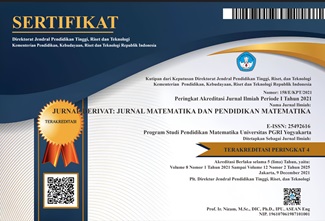Efektifitas Pembelajaran Dengan Pendekatan Contextual Teaching And Learning (CTL) Untuk Meningkatkan Kemampuan Pemecahan Masalah Matematis
DOI:
https://doi.org/10.31316/j.derivat.v5i1.144Abstract
This research is motivated by students' mathematical problem-solving abilities. One way to improve students' mathematical problem-solving abilities is with the CTL learning approach. The purpose of this research is: 1) to know whether the average ability of mathematical problem solving of students who get learning with CTL approach is higher than the average problem-solving abilities of mathematical students who obtain conventional learning; 2) to find out whether the average mathematical problem-solving ability of the students who acquired the learning with Contextual Teaching and Learning (CTL) approach is higher than the minimum criterion value (KKM). This research type is quasi-experiment. The research design used is Nonequivalent Control Group Design. This research was conducted at SMP Negeri 1 Simpang Renggiang, East Belitung Regency in the academic year 2015/2016. Sampling was done by cluster random sampling. The sample in this research is class VII. 2 as the experimental class and class VII.3 as the control class. The research instrument used is a valid test instrument in the form of a matter of pretest and posttest in the form of a description. Data were analyzed using a non-parametric statistic test. The results of the research have shown that the average problem-solving ability of students who acquire mathematics learning with CTL approach is better than students who follow the conventional mathematics learning, the average problem-solving ability of mathematical students who gain learning with CTL approach less than or equal with KKM.
Â
Keywords: Mathematical problem solving, CTL approach, quasi-experiment, cluster random samplingDownloads
Published
Issue
Section
Citation Check
License
Authors who publish with this journal agree to the following terms:
-
Authors retain copyright and grant the journal right of first publication with the work simultaneously licensed under a Creative Commons Attribution-ShareAlike 4.0 International License that allows others to share the work with an acknowledgment of the work's authorship and initial publication in this journal.
- Authors are able to enter into separate, additional contractual arrangements for the non-exclusive distribution of the journal's published version of the work (e.g., post it to an institutional repository or publish it in a book), with an acknowledgment of its initial publication in this journal.
- Authors are permitted and encouraged to post their work online (e.g., in institutional repositories or on their website) prior to and during the submission process, as it can lead to productive exchanges, as well as earlier and greater citation of published work (See The Effect of Open Access).







